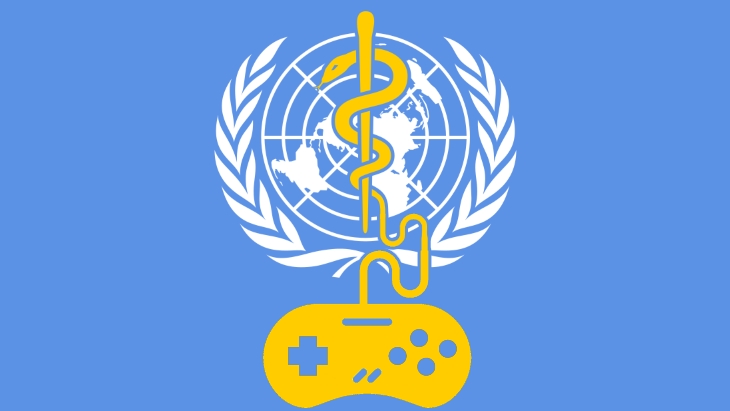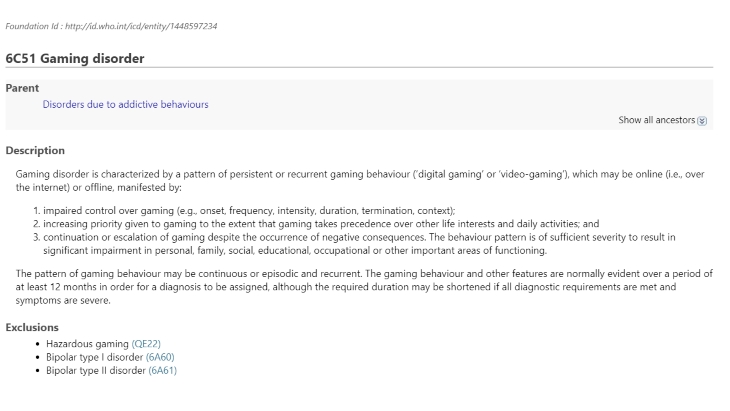
This is an editorial piece. The views and opinions expressed in this article are those of the author and do not necessarily represent the views and opinions of, and should not be attributed to, Niche Gamer as an organization.
Editor’s Note: Due to a technical error, this editorial series was produced in the wrong order. This is the first part of a three part series. You can find part two here, and part three here.
The World Health Organization (WHO) recently declared that “Gaming Disorder” is a disease, having until 2020 to figure out how to prevent and treat it. This was all in spite of several psychologists, scholars and researchers having serious doubts. Even the issues raised in our own article went unnoticed by them. Perhaps they missed the e-mail? So what is the summation of the concerns laid out by the psychologists and scholars during the research stage almost one year prior? This is why gaming disorder is a flawed classification.
It did not clearly define what constituted a video game addiction, it did not disprove it was not a symptom of other mental health issues, it allegedly had poor transparency and research was treated like substance abuse- leading to bias from the outset. In addition there was no indication of research ruling out “unstable” addiction (high symptoms but resolved within months without treatment) and “overdoing gaming” was not clearly defined as different from overdoing enjoyable non-addictive activities.
There were accusations the WHO was responding to moral panic and in turn fueling more moral panic, little to no further research would be conducted, those enjoying the hobby in a healthy manner becoming subject to scrutiny and cause a negative impact on mental health and fear of the diagnosis even being used to restrict and control children.
Finally, there were even accusations that a WHO official admitted there was pressure from unnamed “Asian countries” to make the diagnosis happen. While China seems the obvious candidate (how better to reinforce less game approvals by having the games industry across the world pump the brakes), this is pure speculation. Not to mention the country shows signs of opening up to video games with more recent approvals and the Nintendo Switch possibly soon being sold in the region.
Another muddied accusation came from Dr Geoffrey Reed claiming he was “being petitioned by politicians to make sure gaming addiction is included.” His claims were later denied by Dr. Vladimir Poznyak (coordinator of the Management of Substance Abuse department of Mental Health and Substance Abuse for the WHO)- claiming Reed’s email was “misunderstood”.

Against all this, the WHO still proudly declared Gaming Disorder on May 25th and added it to the ICD database 11th revision (International Classification of Diseases). This database is used by doctors all around the world. It also allows grants doctors who may not speak the same language a uniform way to diagnose and monitor changes in diseases, disorders and other medical concerns. Ideally a doctor in Tokyo would diagnose schizophrenia the same way a doctor would in the US, while also noting if there was an uptick in cases or reporting on an unusual case.
“Characterized by a pattern of persistent or recurring gaming behavior,” the supposed gaming disorder arises in three ways evident over at least twelve months. This undercuts the initial concern that most gaming addiction unstable and self-cured within months. The first possible symptom is impaired control over gaming based on onset, frequency, intensity, duration, termination and context. Basically whatever could be deemed too much, too often or otherwise in excess.
The second is where gaming takes priority over other aspects of a person’s life, such as other interests and daily activities. Missing out on eating and sleeping are obviously a serious issues, but we will return to missing out on other interests later. The third is continuation or escalation despite the occurrence of severe negative consequences in personal, social, familial, education, occupational and other important areas.
So far, so seemingly reasonable. It has attempted to define what the addiction is and that a minimum 12 month period is required. Even many of us who have been accused of the stereotype are no doubt imagining someone playing into the early hours of the morning on multiple occasions, forgetting meals and rejecting well meaning loved ones if they have not already driven them off with their cloistered lifestyle. Of course an addict does not realize or care that they are harming themselves in some way. The rest of us usually elect to give our eyes a rest within the month we over did it, turning in early to make up for lost sleep.

So what is the problem? Do the concerns raised over a year prior still apply? Why should those who do not over-do gaming be worried? For starters, gaming is still stereotyped as enjoyed by someone who is somehow “wrong” and is not fully understood by many. Some of us started gaming because we lacked the social graces or deft skill at sports. No matter the true make-up of gamers nowadays, the stereotype of gamers being anti-social permeates. As social creatures, surely a person who does not want to socialize with “normal” people must have something strange about them in the first place. The normal is judging if the outcast is truly happy by their own standards.
Furthermore, other isolated activities are not treated with the same scorn. Instead of turning to books, film or TV, we turned to games. Something to challenge our minds while having fun. Yet, addiction for the above has rarely gotten the same scrutiny despite film and TV having the potential to be a very mentally passive activity. Compare the staggering difference in the amount of content in Wikipedia articles for television addiction to video game addiction. An article on reading addiction is non-existent. As laid out earlier in psychologist Chris Ferguson’s article on The Hill, there are issues when classifying any behavioral addiction as addictive:
“The same arguments for “gaming disorder” could be made to make anything an “addiction.” Why not “cat addiction?” Given that dopamine release is normal for pleasant activities one could claim that stroking a cat release dopamine “just like cocaine does.”
Many of the symptoms used for gaming addiction such as using the thing to feel better after a bad day can certainly be applied to cats. And we can find anecdotes of people who clearly overdo cats, living in houses full of diseased cats, and persisting in the behavior despite legal consequences. If “gaming disorder” is real, then so is “cat addiction.”

By simple logic, there must be those addicted to TV. Someone obsessively watching films. Someone reading long into the morning despite their eyes feeling like hot coals. Yet, these are treated as a symptom of other issues or behavioral addiction with the subject of the obsession almost being a foot-note. Treating why the person has addictive behavior takes precedent over what the addiction is about.
What makes gaming so special it deserves its own category almost like alcoholism or various kinds of drug abuse instead of another variation of behavioral addiction? There are many clear arguments for social media addiction, yet the WHO have yet to commit to it if searching their website is anything to go by. Within the US there have been accusations of “Trump derangement” and certainly both sides are accusing the other of being mentally unsound. With the increase in politically motivated violence and rioting, what is the WHO’s stance on that? That whole affair is far beyond the scope of this editorial.
The above matches with the earlier concern “those enjoying the hobby in a healthy manner becoming subject to scrutiny and cause a negative impact on mental health”. It may even confirm that it is still being “treated like substance abuse”, which in turn means “little to no further research” was carried out after the initial complaints. We cannot be sure if that is the case, because there is little public information on how the WHO conducted their research- another old complaint that still applies today!

But let us assume that gaming disorder does deserve its own special classification. Being this is the newest, hottest crisis to befall the world- what measures are being taken to ensure there are as few cases of misdiagnosis as possible? The guidelines clearly say the symptoms must persist over 12 months. Unfortunately, the guidelines are not terribly specific. While they do mention context is a factor in one of the symptoms, here are a few things that may give you pause if you know nothing about video games.
Could a streamer be considered an addict? After all they play for long periods of time, several days a week. SullyGnome (a website dedicated to tracking Twitch statistics), notes some of the top streamers can often play for over 5 hours a day nearly every day. Some streaming over 15 hours! When they protest it is their job, is this merely an addict who has managed to monetize their addiction? What of those who play-test games for a living or research them? How many hours did WHO researchers play video games for?
In 2017 US adults spent an average of three hours and 20 minutes a day using their smartphone or tablet (just over 22 hours a week). In 2018, Forbes notes research that US adults (26-35) may have only spent around one hour a day on average (6.51 hours a week). In 2019, this rose to around 8.21 hours a week, barely increasing the average per day by even 10 minutes. Yet, there is seemingly no work going into researching smartphone addiction, internet addiction or the like. Even with the difference of one or two years, where is the dedication to warning others about smartphones?
The aforementioned bias to the hobby, ingrained through years of scaremongering press and stereotyping, only adds to matters. As a doctor you would notice unlike other behavioral addictions, this has its own definition. Furthermore, it is a major issue. Many people are talking about it after all. So, what is normal gaming behavior and what is not? Five hours a week? Ten? How many hours per session? Most films are around an hour and a half, so surely no one healthy would game for three hours straight on a regular basis. “Overdoing gaming” has still not been clearly defined for those who need to judge it.

What concerns still exist from the initial concerns over a year ago? The difference between an unstable addiction and a true addiction has been given a minimum of 12 months. Even though a definition of video game addiction has been given, there are a few much needed specifics that need more elaboration.
We arguably still have transparency issues. We have little information on how the WHO came to its decision, though this sadly seems to be the standard when the general public look into ICD information. There are also signs the report still treats gaming disorder like substance abuse- if not in how it functions than certainly in how serious it allegedly is.
Overdoing gaming has still not been clearly defined. To anyone outside of gaming, they would have no clue what is healthy or not. Only being able to rely on the testimony of the gamer, their family and the physical health of the gamer. Which opens up a whole other can of worms when you consider why someone may lie to a doctor, or a doctor suspects a patient is lying. After all, an addict is going to lie to keep their addiction going, right? This would certainly result in scrutiny of those who are enjoying their hobby in a healthy way, which in turn could have adverse mental health effects depending on the person.
Is the WHO responding to moral panic? With the surprising number of articles dedicated to gaming disorder and video game addiction over the last year (and years prior), there is certainly a panic or at least those wanting there to be one for their own gain (selling a solution or simple click-bait). How the WHO has responded to this remains to be seen. Desperate to quickly find a solution? Trying to stay relevant when a problem has arisen they do not understand? Something underhanded? Only their response to feedback and criticism will help shed light on the matter.

There are a few concerns still left untouched and those that can be elaborated upon further. Has gaming disorder been disproven as a symptom of other mental health issues? Is there reason to believe diagnosis would be used to “restrict and control” children? What harm could a false diagnosis do to a person who was enjoying their hobby in perfect health and peace? Join us for our next editorial on gaming disorder, as we explain: Why Gaming Disorder Classification Could Cause Harm.